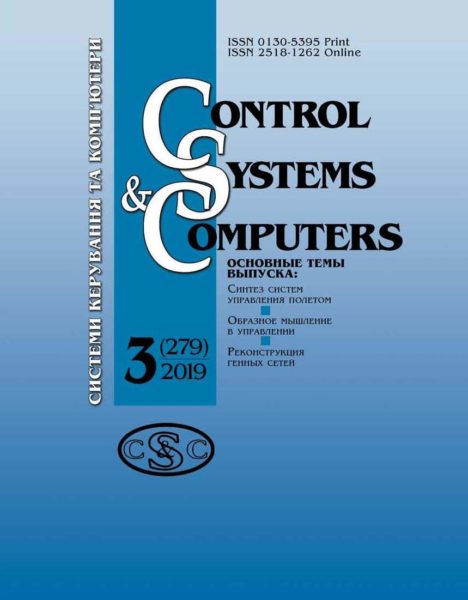Control Systems and Computers, N3, 2020, Article 1
https://doi.org/10.15407/csc.2020.03.003
Control Systems and Computers, 2020, Issue 3 (287), pp. 3-14.
UDK 006.4:004.8
Gritsenko V.I., International Research and Training Centre of Information Technologies and Systems of the NAS and MES of Ukraine, Acad. Glushkov ave., 40, Kyiv, 03187, Ukraine,
Bazan L.I., International Research and Training Centre of Information Technologies and Systems of the NAS and MES of Ukraine, Acad. Glushkov ave., 40, Kyiv, 03187, Ukraine
Harmonization of National and International Standards for Integration
of Digital Economy Technologies
Formulation of the problem. Digital technologies allow for faster and shorter communication between the subject and the management object. The success of the digital transformation of the economy is determined by the harmonization of national and international standards and the pace of their integration, which should ensure quality monitoring of socio-economic processes.
Goal. The problems of harmonization of national and international standards of a series of information technologies with the purpose of ensuring the digital transformation of the economy are investigated..
Methodology. The methods of logical analysis of harmonization of international and national standards in the field of the digital transformation of the economy were used.
Results. The harmonization of national standards with international standards promotes the elimination of technical barriers in trade, the international exchange of goods and services, and the improvement of the technical level and quality of products produced for the immediate benefit of consumers. Levels of standardization are considered: international, regional and national. The general and specific goals of standardization of a series of information technologies are defined. The principles of standardization such as transparency, openness, objectivity, efficiency, diversity and coherence have been identified. The importance of standardization in solving the problems of the digital transformation of the economy is shown, which should ensure the improvement of quality of industrial production, an increase of export potential and increase of competitiveness of national production on world markets.
Conclusions. In order to solve the tasks as quickly as possible and to develop a national standardization strategy in the field of information technologies, it is necessary to assess the current state of modern technological trends in the international system of standards; identify promising areas of standardization in the field of information and communication technologies; analyze the degree of harmonization of national and international standards in the above scope and formulate the most relevant directions of their standardization; to develop a national roadmap for the transition to international standards in Ukraine.
Download full text! (In Ukrainian)
Keywords: standardization, international and national standards, harmonization, information technology, digital economy.
- Kupriyanovskiy, P., Yartsev, D.I., Utkin, N.A., Namiot, D.Ye., 2016. “Ekonomika standartizatsii v tsifrovuyu epokhu i informatsionno-kommunikatsionnye tekhnologii na primere Britanskogo instituta standartov”, International Journal of Open Information Technologies, 4 (6), pp. 1-9. (in Russian).
- Kupriyanovskiy, P., Namiot, D.Ye., Sinyagov, S.A., Dobrynin, A.P., 2016. “O rabotakh po tsifrovoy ekonomike”, Trudy I Mezhdunarodnoy nauchnoy konferentsii “Konvergentnyye kognitivno-informatsionnyye tekhnologii” (Convergent’2016), Moskva, 25-26 Nov., 2016, pp. 243-249. (in Russian).
- Namiot, Ye., Shneps-Shneppe, M.A., 2016. “Ob otechestvennykh standartakh dlya Umnogo Goroda”, International Journal of Open Information Technologies, 4 (7), pp. 32-37. (in Russian).
- Namiot, D.Ye., Kupriyanovskii, V.P., Sinyagov, S.A., 2016. “Infokommunikatsionnye servisy v umnom gorode”, International Journal of Open Information Technologies, 4 (4), pp.1-9.
- MachinaResearch Global Advisors on M2M, IoT and Big Data. [online] Available at: <https://machinaresearch.com/>. (in Russian).
- Gerasimova, Ye. B., Gerasimov, B. I., 2012. Metrologiya, standartizatsiya i sertifikatsiya, uchebnoye posobiye, FORUM, Moscow, 224 p. (in Russian).
- Lifits, I.M., 2019. Standartizatsiya, metrologiya i podtverzhdeniye sootvetstviya, uchebnik, Izdatelstvo Yurayt, Moscow, 363 p. (in Russian).
- Dimov, Yu.V., 2013. Metrologiya, standartizatsiya i sertifikatsiya, uchebnik dlya vuzov, Piter, S-Pb., 496 p. (in Russian).
- Grytsenko, V.I., Onyshchenko, I.M., 2017. “Vyznachennya informatyvnosti parametriv modeli prohnozuvannya ymovirnosti vyboru produktu v umovakh “Big Data”, Kibernetika i vychisl. tekhnika, 4 (190), pp. 5-18. (in Ukrainian).
https://doi.org/10.15407/kvt190.04.005 - Zakon Ukrayiny Pro standartyzatsiyu № 2742-VIII vid 06.06.2019. [online] Available at: <https://taxlink.ua/ua/normative_acts/zakon-ukraini-pro-standartizaciyu/>. (in Ukrainian).
- Garmonizatsiya tsifrovikh rynkov v stranakh vostochnogo partnerstva. Obzor osnovnikh rezultatov. [online] Available at: <https://www.euneighbours.eu/sites/default/files/publications/2019-10/fact%20sheet%20dig%2004%20Moldova%20Russian%206.pdf>. (in Russian).
- Okremi aspekty formuvannya natsionalnoyi stratehiyi zabezpechennya perekhodu do vysokotekhnolohichnoho ekonomichnoho rozvytku. [online] Available at: <http://www.euroosvita.net/prog/data/attach/5189/niss.pdf>. (in Ukrainian).
Received 10.02.2020



